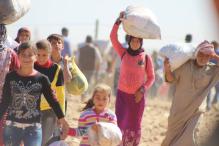Today’s violent conflicts are proving deadlier and more difficult to resolve than ever before. Over the past decade, the number of civil wars has nearly tripled, driven by a growth in transnational criminal networks, greater presence of radical groups in many settings and a willingness of international actors to support intra-state conflicts. This, in turn, has contributed to historic levels of conflict-related displacement and far higher numbers of civilians caught up in violent conflict.
There is a growing recognition too of the role of climate change in exacerbating conflict risks. Climate-related changes in transboundary water resources, food security, sea levels, flood risks and migration patterns are already impacting the stability of many States and will require large-scale adaptation and mitigation. Some have even warned of impending “climate wars,” driven by a dramatic shortfall in key resources as the world overheats. As these trends continue to affect a growing number of countries around the world, UN Secretary-General António Guterres has explicitly placed climate change as a central aspect of the UN’s prevention agenda, as have key Member States.
Recent UN reforms offer an opportunity for the UN and its partners to adopt conflict-sensitive prevention approaches, taking into account the role of climate change in the risk landscape. In particular, reform of the Resident Coordinator (RC) system demands that the UN be better positioned to prevent conflict, including through improved analysis, planning and coordination with other actors. Additionally, the creation of a Climate-Security Mechanism spanning three UN entities has created a centre of gravity and a small but dedicated set of capacities to help improve the analysis of, and response to, climate-related security risks in the UN system.
This report aims to support the UN and its partners in developing climate-sensitive conflict prevention approaches. It offers: (1) a literature review covering the major scholarship on the links between climate change and violent conflict; (2) in-depth case studies on climate-security dynamics in Bangladesh and Nigeria; and (3) cross-cutting conclusions and recommendations for the UN system.
The main cross-cutting recommendations are as follows:
- Analyse indirect impacts.
- Focus on governance, not just scarcity.
- Build up foresight capacities.
- Look for maladaptation and inequality.
- Adopt multi-scalar, cross-border responses.
- Build a common language for climate-security.
- Prioritize and bring climate-security into the broader climate discussion.
- Strengthen knowledge management and build an evidence base.
Access Conflict Prevention in the Era of Climate Change: Adapting the UN to Climate-Security Risks here.
Suggested citation: Conflict Prevention in the Era of Climate Change: Adapting the UN to Climate-Security Risks : UNU-CPR, 2024.


